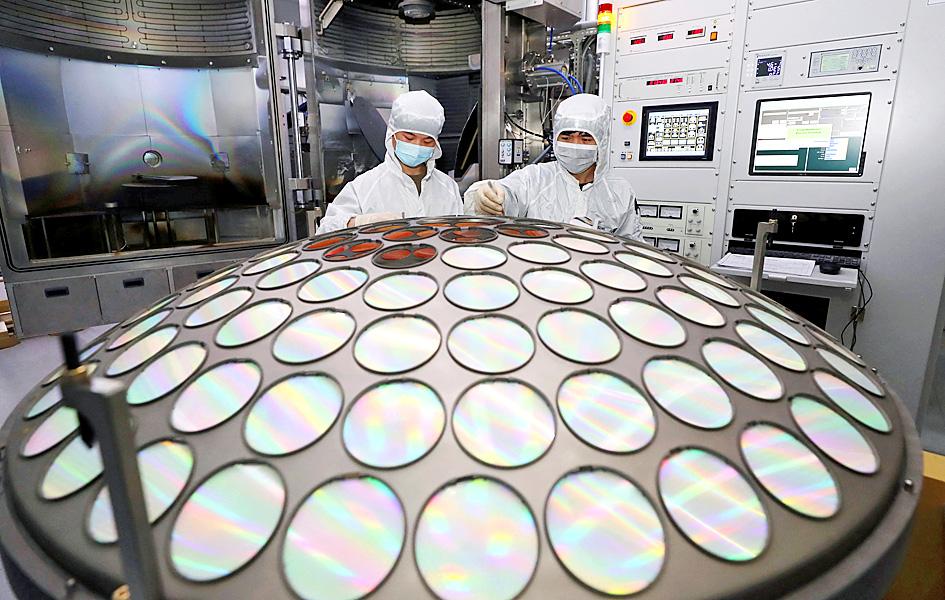Taiwan is to become the world’s largest spender on front-end chip manufacturing equipment this year, thanks to robust demand for chips used in vehicles and high-performance computing devices, international trade group SEMI said yesterday.
Fab equipment spending in Taiwan is forecast to rise 52 percent year-on-year to US$34 billion this year, ahead of South Korea’s US$25.5 billion, where it would be up 6 percent from the previous year, and US$17 billion in China, down 14 percent from its peak last year, SEMI said in its World Fab Forecast report.
Moreover, Europe and the Mideast combined would register record spending of US$9.3 billion this year, an annual surge of 176 percent, the report said.

Photo: Reuters
Overall, global fab equipment spending is expected to increase 20 percent this year to a record level of US$109 billion from US$91 billion last year, marking a third consecutive year of growth following a 42 percent surge last year, the report said.
Taiwan, South Korea and Southeast Asia are expected to register record investments this year, it added.
The global semiconductor equipment industry is on track to cross the US$100 billion threshold for the first time this year, SEMI said.
“This historic milestone puts an exclamation point on the current run of unprecedented industry growth,” SEMI president and chief executive officer Ajit Manocha said in a statement.
Total capacity in the global semiconductor industry is to expand by 8 percent this year after a 7 percent increase last year, and the growth is expected to continue next year with an annual growth of 6 percent, it said.
“The world semiconductor market was affected by changes in demand for end devices and inflation, causing a short-term inventory adjustment for chips used in certain electronic products, but, the industry is still on track to meet its long-term growth targets, benefiting from strong demand for automotive electronics and high-performance computing applications,” SEMI Taiwan president Terry Tsao (曹世綸) said in a statement.
The SEMI report showed that more than 85 percent of the spending on equipment this year would stem from capacity increases at 158 fabs and production lines.
The ratio is expected to be 83 percent next year after 129 fabs and production lines add capacity, it said.
The foundry sector is to account for the bulk of equipment spending this year and next year at about 53 percent, followed by the memory sector at 33 percent this year and 34 percent next year, the report said.
The forecast comes as major Taiwanese foundries are boosting capital spending this year to address a global chip shortage.
Taiwan Semiconductor Manufacturing Co (台積電) has budgeted record expenditure on equipment of US$40 billion to US$44 billion this year, including back-end equipment for chip testing and packaging services, while United Microelectronics Corp (聯電) has doubled its capital expenditure this year to US$3.6 billion from US$1.8 billion last year as it adds capacity at its fabs.

NEW IDENTITY: Known for its software, India has expanded into hardware, with its semiconductor industry growing from US$38bn in 2023 to US$45bn to US$50bn India on Saturday inaugurated its first semiconductor assembly and test facility, a milestone in the government’s push to reduce dependence on foreign chipmakers and stake a claim in a sector dominated by China. Indian Prime Minister Narendra Modi opened US firm Micron Technology Inc’s semiconductor assembly, test and packaging unit in his home state of Gujarat, hailing the “dawn of a new era” for India’s technology ambitions. “When young Indians look back in the future, they will see this decade as the turning point in our tech future,” Modi told the event, which was broadcast on his YouTube channel. The plant would convert

‘SEISMIC SHIFT’: The researcher forecast there would be about 1.1 billion mobile shipments this year, down from 1.26 billion the prior year and erasing years of gains The global smartphone market is expected to contract 12.9 percent this year due to the unprecedented memorychip shortage, marking “a crisis like no other,” researcher International Data Corp (IDC) said. The new forecast, a dramatic revision down from earlier estimates, gives the latest accounting of the ongoing memory crunch that is affecting every corner of the electronics industry. The demand for advanced memory to power artificial intelligence (AI) tasks has drained global supply until well into next year and jeopardizes the business model of many smartphone makers. IDC forecast about 1.1 billion mobile shipments this year, down from 1.26 billion the prior

People stand in a Pokemon store in Tokyo on Thursday. One of the world highest-grossing franchises is celebrated its 30th anniversary yesterday.

Zimbabwe’s ban on raw lithium exports is forcing Chinese miners to rethink their strategy, speeding up plans to process the metal locally instead of shipping it to China’s vast rechargeable battery industry. The country is Africa’s largest lithium producer and has one of the world’s largest reserves, according to the US Geological Survey (USGS). Zimbabwe already banned the export of lithium ore in 2022 and last year announced it would halt exports of lithium concentrates from January next year. However, on Wednesday it imposed the ban with immediate effect, leaving unclear what the lithium mining sector would do in the